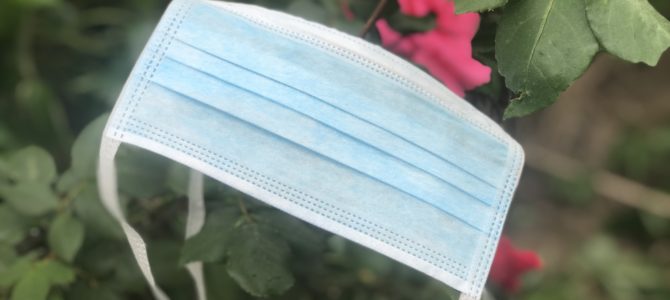“I don’t care about philosophy, just tell me how it ends.” That line is repeated on the final page of Len Jenkin’s play ‘Dark Ride.’ I’ve been thinking about Len, whom I had the great pleasure of working with a few times, a lot of late. His work always creates a world a bit out whack, dusty and dim, characters engaged in slow motion chaos. Today’s creepy streets of masked New Yorkers feel like a Len Jenkin play, and all anybody wants to know is how it ends.
When can we take off the masks? It’s a simple enough question. Three months ago pretty much nobody outside of recent Asian immigrants in urban Chinatowns donned the face protectors, but now they are ubiquitous. As with so many changes the Chinese virus has wrought on our lives, the emerging question is whether the changes are temporary and specific to this one threat, or if they will become permanent.
After all, even if the virus disappeared tomorrow through some force of magic, facemasks would still be an effective tool to slow the spread of other deadly diseases like the flu. If the philosophy is that changing our ways is worth it if it “saves one life,” then the end of this will be everyone wearing masks at baseball games and plays, in airplanes and shopping malls.
And mask wearing is, as its proponents point out, a small thing. Just like keeping six feet apart is a small thing, just like not attending church is a small thing, just like being contact traced is a small thing. But the thing about small things is that when you stack them up they can get pretty big. The “new normal” like a pointillist painting will be constructed of small dots that together create an entire vision of reality.
The whole coronavirus crisis has been a long exercise in cost benefit analysis. But as deaths decline and states reopen the crisis may be abating, but its social after-effects could be with us for a long time to come. Is there a metric that can be reached which would mean we could take off the masks? If so what is it? It is my very real fear that for many Americans the answer is no, and they will wear the mask until something other than a virus takes them to their graves.
This is a discussion that we need to be having. Because if we are to become a nation of faceless mask wearers it ought to be an active choice, not a jaundice we creep into by being peevish. We must be in control of the lifestyle changes that come from this experience, not controlled by it. Nor should we acquiesce to medical experts in making these decisions. They have a role to play, of course, but it is not dispositive, nor are they always right anyway.
In emergencies people and societies react fast, often in inefficient and ineffective ways. Life becomes about getting through the moment, not about creating a future. We are now two months into this unprecedented season of death and economic devastation. It is time to look forward.
For my part I reject the idea that the facemask should become a permanent mark of American life. I want to smile at people; I want to see facial expressions and a pretty woman’s lipstick. These are not minor aspects of life; they are deeply ingrained in the experience of being human.
The final line of ‘Dark Ride’ is delivered by a disembodied voice, Len loves a good disembodied voice, it says, “Those who wish to ride again stay in your seats. A man’ll be around to take your tickets. Those getting off, step lively. Exit to your left or your right.” I’m ready to step lively; unlike Len’s play this dark ride is no amusement.
Will we wear the masks forever? Will some of us? Will that mark some division in our society? Is that the mark we want to leave on the world? Do we want to explain to our kids that there used to be a world where faces abounded and fear was not the coin of the realm but we destroyed it? These are the questions we have to answer and we have to answer them now.









